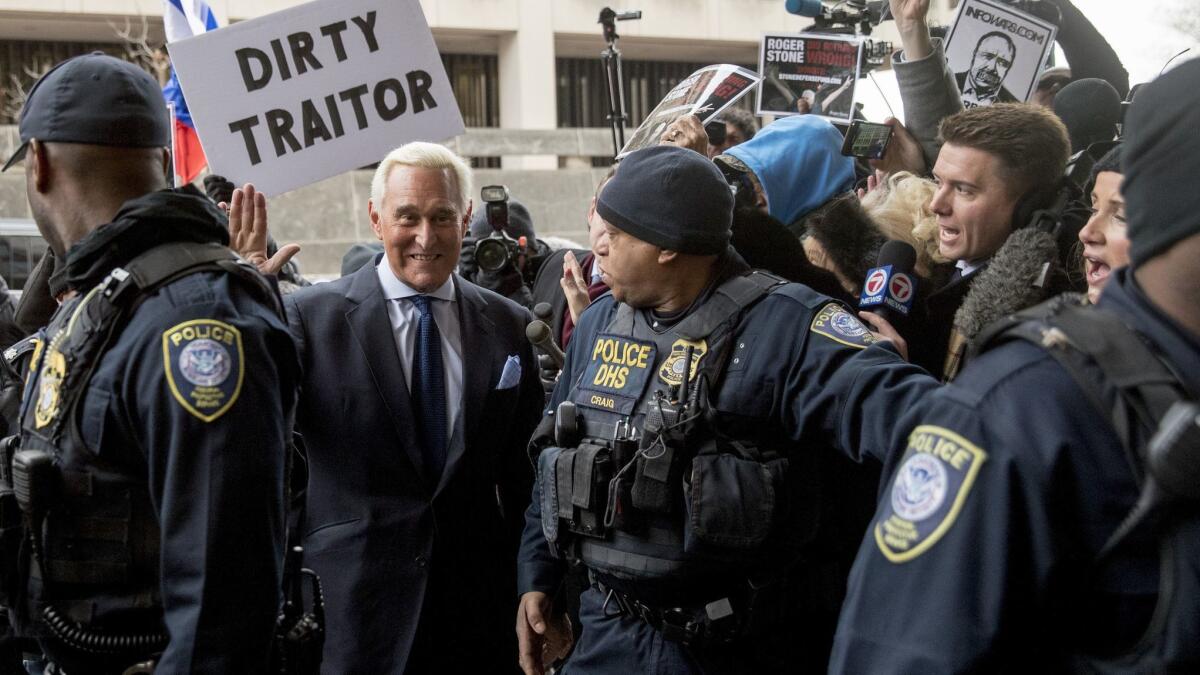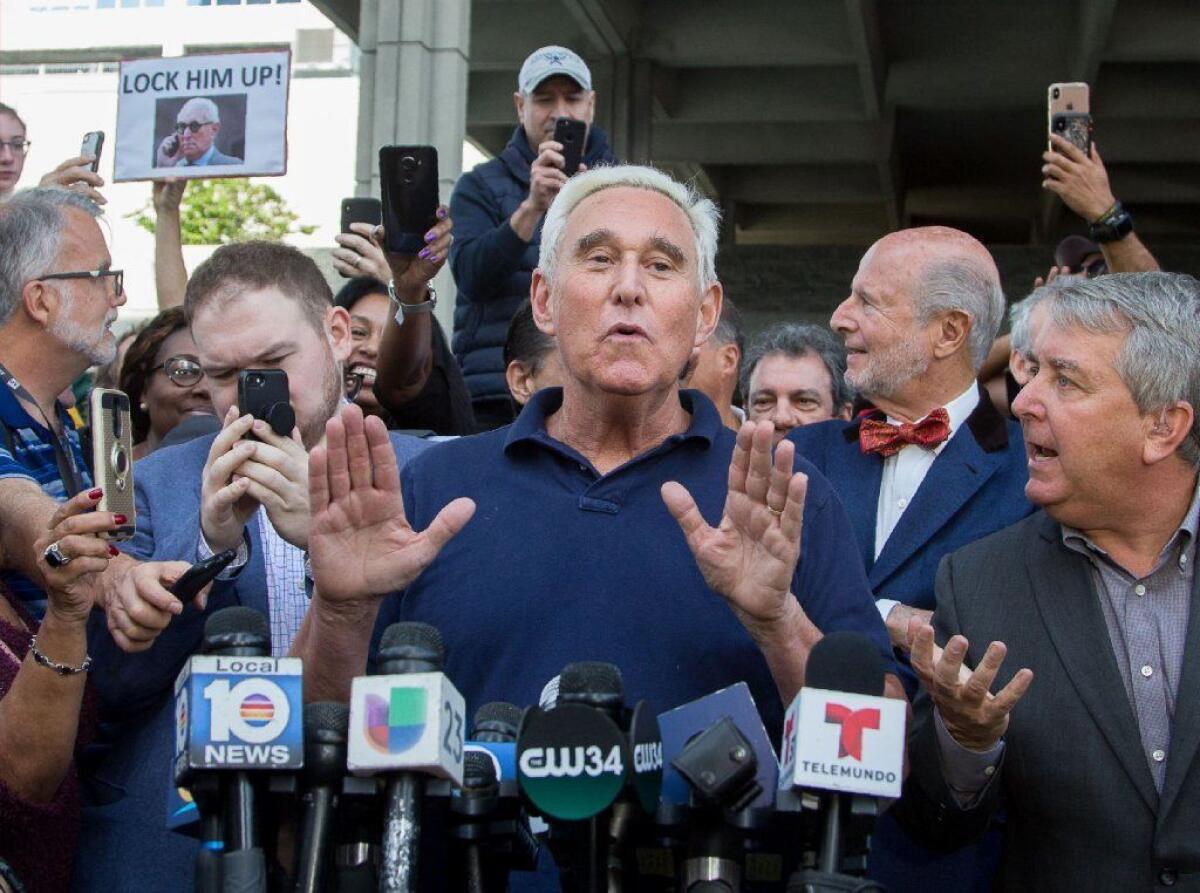Roger Stone, Trump ally and advisor, pleads not guilty in Russia investigation

Reporting from Washington — After pleading not guilty Tuesday to seven felony charges, Roger Stone emerged from the federal courthouse here into the kind of fever dream fracas that he has sought for decades as the country’s most notorious Republican operative.
A woman in a long mink coat hoisted a homemade sign that said, “We stand with Stone,” while protesters waved Russian flags and blasted the Beatles’ “Back in the U.S.S.R.”
A giant inflatable rat topped by President Trump’s distinctive hair loomed across the street. Camera crews and reporters shouted questions and jostled to get close to Stone.
Stone threw his arms high into the V-for-victory sign made infamous by his hero, President Nixon, and rushed through the crowd to a black SUV without saying a word.
His silence didn’t last long. Stone soon called the conspiracy website InfoWars to denounce the charges against him as a “legal lynching,” a typical statement from the Russian investigation’s most unconventional defendant.
No one else charged by special counsel Robert S. Mueller draws a street circus like Stone. But no other suspect has reveled in his image as a dirty trickster known for running his mouth and deriding his opponents.
That could soon come to an end.
U.S. District Judge Amy Berman Jackson is scheduled to hold a hearing on Stone’s case Friday and could impose a gag order — just as she did when she handled Mueller’s prosecution of Paul Manafort and Rick Gates, the chairman and deputy chairman of Trump’s 2016 campaign.
Subscribe to the Los Angeles Times to read all of our award-winning journalism »
Prohibitions on speaking openly about a pending trial are usually intended to prevent prosecutors and defense lawyers from trying the case in the press and influencing a potential jury.
“Sooner or later, the government will move to gag me,” Stone told InfoWars. “But if I have a right to remain silent under the Constitution, I have a right to defend myself.”
Michael Caputo, a longtime associate who also worked for Trump’s campaign, laughed when asked to ponder the possibility of Stone staying silent.
“What would that be like? I can’t even imagine it,” he said. “I think it would be difficult.”
For Stone, he added, “Silence is not an option.”
Stone has barely stopped talking since he was arrested last Friday at his home in Fort Lauderdale, Fla. Hours later, after he was released on a $250,000 bond, he made his views clear in an impromptu news conference on the courthouse steps.
“As I have always said, the only thing worse than being talked about is not being talked about,” he began.

That night he told Chris Cuomo on CNN that prosecutors were taking his text messages “out of context” in the indictment against him. And on Sunday he told George Stephanopoulos on ABC that he did not intentionally lie to the House Intelligence Committee, as Mueller charged, blaming instead a “failure of memory.”
The special counsel’s office declined to say if they will seek a gag order, but former prosecutors and defense lawyers said they expect Jackson to impose one.
“The chances of her imposing a gag order, in my opinion, are 100%,” said Shanlon Wu, who represented Gates when Jackson chastised the defendant for violating a gag order by recording a video message that was played at a fundraiser for his legal defense fund.
Jackson also scolded Manafort for issuing a public statement when Gates, his co-defendant, cut a deal with prosecutors to plead guilty. Gates ultimately testified against him.
Wu said defense attorneys generally don’t want their clients talking publicly anyway.
“I would say that if you took a poll of 10 defense lawyers, all 10 would say it’s crazy and it will only end up causing problems,” he said. “You don’t have an opportunity to control the message.”
Steve Levin, another defense lawyer and former federal prosecutor, agreed.
“I could imagine that Mr. Stone’s own lawyers would be happy with a gag order,” he said. “You have a defendant making statements that could contradict certain things he said before, and play into prosecutors’ hands.”
One of Stone’s lawyers, Grant Smith, defended Stone’s decision to speak publicly about his case.
“Roger speaks for himself,” he said. “Everybody will tell you that clients are the ones who direct their case. Lawyers give advice. And clients have the ultimate power to make the decision about how to proceed.”
The 24-page indictment against Stone portrays him as eagerly seeking to contact WikiLeaks, which received hacked emails from Russian operatives as part of Moscow’s covert effort to boost Trump’s candidacy.
Sometimes he allegedly used Jerome Corsi, a far-right writer, as an intermediary. Corsi told MSNBC on Monday that Stone called him before the Washington Post released the “Access Hollywood” tape, which captured Trump boasting about sexual assault, on Oct. 7, 2016.
Stone said WikiLeaks should start releasing more emails as a distraction, Corsi said, and soon after the organization started publishing messages hacked from the account of John Podesta, Hillary Clinton’s campaign chairman.
The allegation involving the “Access Hollywood” tape was not part of the indictment, and Smith denied that the phone call happened.
“Roger vehemently denies that,” Smith said. “And I have seen no evidence whatsoever that is truthful.”
More to Read
Get the L.A. Times Politics newsletter
Deeply reported insights into legislation, politics and policy from Sacramento, Washington and beyond. In your inbox three times per week.
You may occasionally receive promotional content from the Los Angeles Times.











